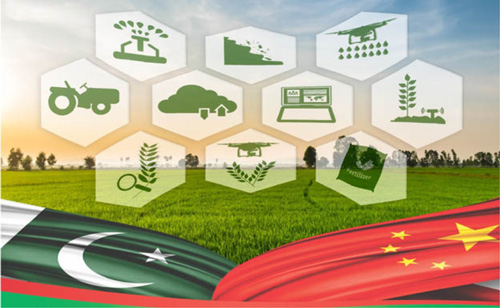Reema Shaukat
CHINA-Pakistan Economic Corridor (CPEC) is a comprehensive plan which addresses many areas pertaining to human security and development. One of the important aspects of it is food safety and security. Considering the vital essentiality of the human needs along with growing population this area needs not only to be focused primarily by world but both the countries China and Pakistan are also focused in emphasizing this aspect. It is important to highlight that for the past two years United Nations has started marking 7th of June as world Food Safety Day every year. This Day as the name suggests is to draw world attention and inspire action to help prevent, detect and manage food-borne risks, contributing to food security, human health, economic prosperity, agriculture, market access, tourism and sustainable development. According to United Nations Organization, food safety is a shared responsibility between country’s governments, producers and consumers. Everyone has a role to play from farms to table to ensure the food we consume is safe and will not cause damage to our health. Through the World Food Safety Day, World Health Organization also pursues its efforts to mainstream food safety in the public agenda and reduce the burden of food-borne diseases globally. The purpose of this Day is to ensure whatever food we are eating is safe and nutritious, grown with good practices in agriculture and accessible to common man.
Considering the fact that among the total world population, the UN’s Food and Agriculture Organization, FAO estimates that about 815 million people of the 7.6 billion people in the world, or 10.7%, were suffering from chronic undernourishment in 2016. Almost all the hungry people live in lower-middle-income countries. There are 11 million people undernourished in developed countries and 45% of all child deaths occur because of poor nutrition and hunger. One way or the other human existence and survival is dependent on access to food as without which man cannot function and have required energy to perform its daily tasks. Pakistan is also dealing with the issue of food {in-}security where according to Year-2017 statistics by World Food Programme almost 60% of Pakistan’s population is having no or limited access to food, malnourished and often relying on hazardous food.
Pakistan via the venture of CPEC is hoping to boost its agriculture and infrastructure sectors where new methods and technologies are adopted with the help of China to bring improvement in agriculture sector particularly. Pakistan’s government is focusing on mounting the agriculture sector on modern lines to improve the livelihood of small farmers and enhance its contribution in the national economy noting that agriculture constitutes the largest sector of economy and agriculture cooperation with China is to be enhanced under this flagship CPEC project. Special efforts are underway to initiate joint ventures with leading Chinese agriculture companies in various sectors of agriculture to enhance agricultural output and value addition of agricultural products for mutual benefit of both countries. Particularly there are areas which hold a lot of scope for increasing cooperation like livestock, fisheries, citrus, mangoes, rice, potatoes and horticulture.
CPEC is progressing with steady pace despite Covid-19 scenario which has affected globally and development seems little slow for the time being. With the initiation of 2nd phase of CPEC, agricultural development is more focused but considering the demand and supply, there is a dire need that food experts and strategists should devise methods for required production and later export of agricultural merchandises. Without any doubt, CPEC provides Pakistan an opportunity to revisit its food insecurity problems and after addressing those issues, access to international markets be made more viable. In this regard, different steps needed to be carried out such as local capacity building initiatives, discouraging urbanization and public awareness campaigns regarding food security concerns especially which are threatened by climate change. Food experts believe that CPEC project can give boost to untapped areas like sea food, palm and edible oils exports or production and export of hay and silage. Likewise in order to deal with problems of food storage and considering natural calamities like excessive rains and floods, warehouses be made with proper safety measures so that any kind of harvest and its yield is not wasted or at least farmers should be aware of preserving food with better technological equipment and that too for longer duration. Pakistan, no doubt, is a blessed country in terms of terrain, topography and climate but being a developing country and keeping in mind the challenges of climate change, global warming and increasing pollution, we must devise strategy to have better food production. Especially those food sectors where Pakistan has better productivity like citrus and seasonal fruit, corn, wheat, pulses, barley should be harvested not only on larger scale but government must emphasize on their storage capabilities and later targeting potential markets internationally.
Sea food is considered another vital component of ecosystem which is shared by coastal areas and littoral states. Pakistan is blessed to have more than 1000 kilometres long coastal belt which provides an excellent quality of seafood. Seafood being a natural resource of food is considered as an excellent source of protein and the worldwide demand makes it quite expensive. On the other hand, Pakistan can reach international market for its fresh and excellent quality seafood via CPEC by focusing on aquaculture and sustainable fisheries. There are challenges attached to marine biodiversity and fishing techniques, yet Pakistan can overcome these deficiencies. Considering the trials attached to food safety and insecurity, there are workable solutions available which Pakistan can avail with the help of China and make it better. Definitely when it is called a win-win situation, then both countries can expedite each other, Pakistan provides the opportunities and China can make them obtainable through resources.










